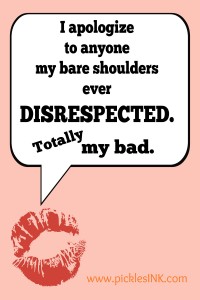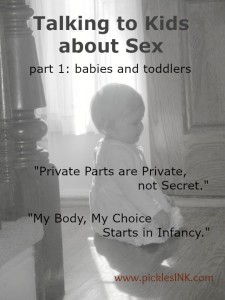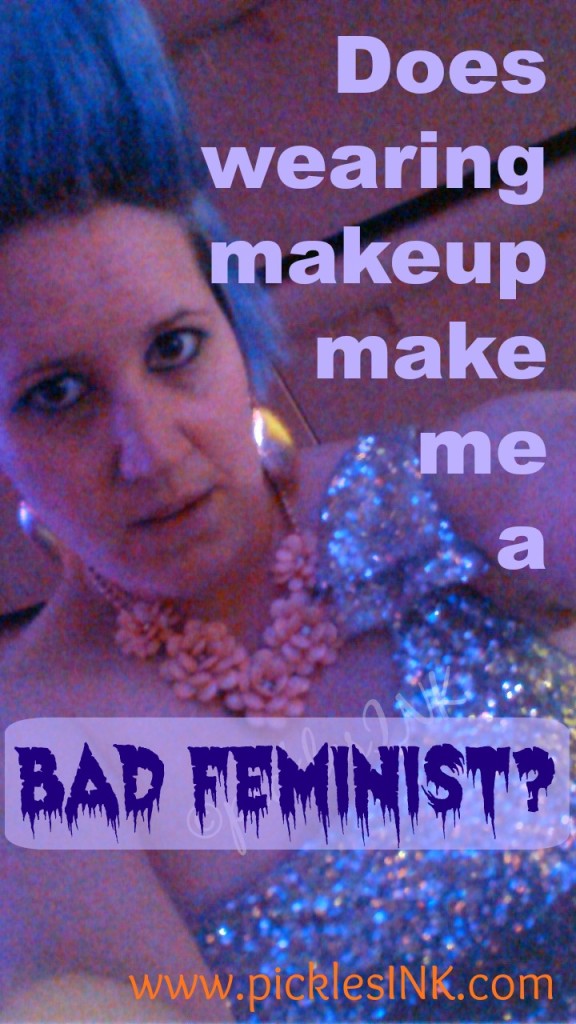When I was in high school, I was the goodiest of all two-shoes. My marks were in the high 80-90s across the board. I sang in 3 choirs, if you count the children’s church choir I assistant-directed. I played 2 instruments in 3 orchestras, including my school’s professional double quartet. And by professional I mean we played actual paid gigs; the school hired us out to play functions on our own time, earning $500 a pop which went straight into the school’s bank account. But, y’know…happy to oblige, right?
I didn’t go to parties. I didn’t drink. I didn’t smoke. I didn’t even know what a mary-ju-wanny cigarette looked like, and I didn’t even round first base until I was in university.
When you consider the external pressure of a high-achieving family and an expensive private school education, combined with the internal pressure of a type A perfectionist personality, something’s bound to give, right? On top of that, there were a lot of shitty things going on at my school, some that I was just witness to and others that impacted me personally, and there comes a point when you have to do something to push back.
I directed the majority of my aggression internally, as many of your teenage girls do, but I had one small form of outward rebellion – just one. Every morning I woke up and put on a dark-coloured brassiere before I buttoned up my white oxford shirt. It was my way of subtly flipping off the entire institution. I was well aware that my snazzy undergarments were visible through my uniform shirt, and I loved it.
I wasn’t the only one. There were hundreds of us with our little micro-rebellions – rolled up kilts and rolled down socks; hiding friendship bracelets under our shirtsleeves and concealing polished fingernails in our fists. One student wore a band-aid over a nose piercing for months, ripping it off every day at 3:45 and letting her silver ring breath free. We weren’t trying to impress any boys. There weren’t any boys to impress, unless you count the maintenance guys we used to bum cigarettes from or that computer tech who offered to split a joint with me at a club.
It seemed fitting – the ways that they were screwing me over were well within their framework of rules and policies, and so was this. Trust me. I checked.
By all accounts though, my choice of attire was “unprofessional.” Shouldn’t the school have put a stop to this? Isn’t it their job to teach me to maintain proper decorum? How would I one day find gainful employment if I didn’t even understand how to dress the part?
The thing is – I did understand. Completely. I understood that school was not, in fact, a job. I understood that school was a place where I was expected to study and learn so I could get good marks and go to a good university. I understood that school was a place where I was expected to treat my teachers and fellow students with respect. School may have been a lot of things, but a job it was not; a job, you see, pays you money.
Of course, it being a private school, I also understood that I was required to follow certain standards of dress and accessorizing (uh…none), so I wore all of the uniform pieces that were required of me. I carefully noted, however, the lack of supportive undergarment-related parameters in my school’s Code of Conduct – Uniform Policy, and smiled to myself as I hooked together my navy and white gingham bra.
I also understood jobs. My job at the time was babysitting, of which I did rather a lot, and for that endeavor, I dressed differently – appropriately, one might say, if by appropriately one meant, “Wearing stuff that wouldn’t be damaged while playing with children and was easily laundered.” Obviously, this ruled out my uniform since that blinking kilt had to be ironed within an inch of its life. Word to the wise – if you’re choosing a private school for your daughter, the wider the pleats, the easier the care.
And interestingly enough, I figured all this out by myself. My school didn’t educate me in how to dress appropriately for babysitting. Or for being an auto mechanic. Or a flight attendant. Or a swimming instructor. Or a lawyer. Or a professional beach volleyball player. When I hear people say that students need to dress appropriately at school to prepare them for the standards of dress they will encounter in their workplace, I always wonder, “What kind of workplace?”
At school we sit at a desk and write stuff and sometimes we use computers, so I guess we equate it with an office job and impose or encourage standards similar to what you would find in that environment. But if school is supposed to prepare students for entry into the workforce, why can’t we think outside the cubicle?
Or is it less about clothes and more about teaching students that in the workplace they will be expected to follow instructions, including but not limited to standards of dress. I guess that makes a little more sense, but aren’t there enough rules for them to follow already before clothing even enters into it?
All right – let’s accept for the moment that it *is* the education system’s job to prepare students for the workforce, and that setting and enforcing clear dress codes are one way to do that. The next issue that we arrive at is the fact that school dress codes are inherently discriminatory, disproportionately singling out women and girls.
With the help of my friend Google, I’ve had a look at some school dress codes in Ontario – elementary and secondary schools in both the public and Catholic boards, and here is what I’ve come up with:
We are fortunate that school dress codes contain helpful, concrete descriptions that can in no way be misconstrued, like “modest,” “respectful,” “respectable,” “inoffensive,” “non-distracting,” “neat,” “appropriate,” “proper,” and “decorous.” Clothing should not, on the other hand, be “distasteful,” “revealing,” “distracting,” “offensive,” or “sexually provocative.”
Well, that should be easy to figure out and to follow, right? No margin for error there! On the off chance that you do have difficulty interpreting the guidelines (or *cough cough* happened to stumble upon a loophole), they often include helpful summary sentences like these:
“All clothes are to be appropriate for the learning environment as deemed so by the staff at the school.”
“The Administration reserves the right to decide on appropriate attire.”
Perfect! No matter how iron-clad the rules are, there’s a leetle space for wiggle room in the form of arbitrary judgement.
This one actually acknowledges that different attire is suited to different settings:
“Clothing that may be appropriate at home, at the beach, or at a nightclub may not be appropriate at school.”
Unfortunately, that sentence is preceded by this one:
“All members of the school community must dress in a way consistent with a scholarly tone: dress that reflects personal pride and respect for others.”
A scholarly tone? I’m not sure what that means. Can you elaborate? “Members of the school community are required to be adequately covered to be consistent with a scholarly school tone.”
Scholarly tone = adequately covered = reflecting personal pride and respect for others.
Gotcha. I do apologize to anyone my bare shoulders ever disrespected. Totally my bad.
Not wanting to leave anything up to chance, it gets even more specific: No clothing or accessories which “are unduly distracting, including but not limited to, dress which is sexually provocative, torn or ragged.”
Ah, there’s the rub, right there in black and white:
Sexually provocative = unduly distracting.
This one includes a rationale . Apparently, the dress code contributes
- to a safer and more secure school policy;
- to the development of an educational learning environment;
I had no idea that modest dress was safer and more educational. You learn something new every day. Oh, but wait…Something’s coming back to me…Now that I think about it, I do recall hearing something about that back in “How Not To Get Raped 101,” otherwise known as a day in the life of a girl in rape culture.
That very same school concludes with a catchy little slogan just to drive the point home: “Remember: If we can see up it, down it, or through it, then it shouldn’t be worn at school!”
But I’m sure that’s directed at both genders equally…
I’m happy to report that my school took my rebellion in stride. While I happen to know that there were several changes made to the uniform policy after I left, it was never addressed with me, aside from the one teacher who, her clipped English accent dripping with sarcasm, “That’s a very nice checked brarr, Kahryn.”
The lack of reaction was a surprisingly feminist response. They had certainly come a long way from the lines of girls kneeling in the hallways to face the yardstick kilt-measure of my middle school years, and even farther from the “line up and bend over,” bloomer-checks that were rumoured to have been conducted not long before my time.
Why am I telling you all this?
I’m telling you this because it is important to understand that there is a person in those short-shorts or wearing those visible bra-straps, and she doesn’t necessarily lack self-respect or an understanding of appropriate attire.
She may have a stable father figure, or she may not. Her parents probably raised her just fine, or maybe they didn’t, but her clothes don’t tell you anything about that.
She’s not “asking for it.”
She’s not necessarily wearing the only thing she can afford, or she might be, and she might have chosen to wear it anyway, or maybe she wishes she had something different.
She’s not doing it because she enjoys the attention from most of the boys and some of the girls. Or she might be, and that’s her business too. Me, I enjoy attention, so I dye my hair purple, because sadly, the attention I get for showing parts of my body is not what it used to be – “Mommy!! Your breastses are HANGING DOWN!!”
She’s not showing disrespect to her teachers or to her classroom, because how is showing her own skin, or a half-inch wide strip of elasticized fabric, being disrespectful, unless of course we are operating on the premise that a woman’s body or undergarments are somehow offensive?
She’s Just. Wearing. Clothes.
And maybe if we stopped getting our granny panties in a knot about it we could get on with dealing with the far more serious things that teenagers today are dealing with.
Like Bullying.
Mental illness.
Substance use.
Rape and sexual assault.
Academic disengagement.
Unemployment and underemployment.
Perhaps our outrage and our measuring tapes could be put to better use.
~ karyn

I apologize to anyone my bare shoulders ever disrespected. Totally my bad.



